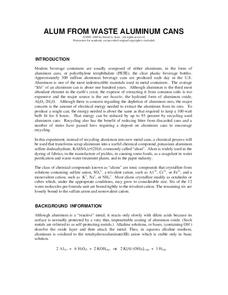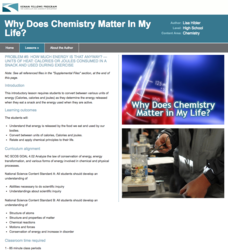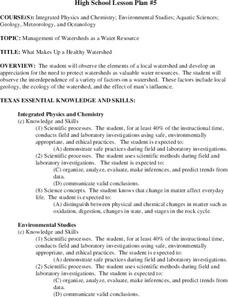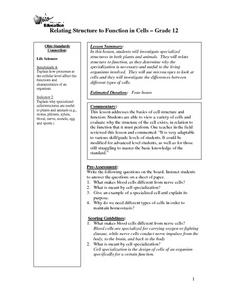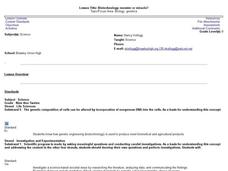Chymist
Alum from Waste Aluminum Cans
Turn aluminum cans into pickles! An engaging experiment has learners chemically change aluminum into a substance with many purposes including the manufacture of pickles. After performing the chemical conversion, the experimenters verify...
Cornell University
Nano What?
The size of a nanoparticle is difficult for pupils to grasp. A hands-on experiment is designed to give your classes perspective. Learners analyze different sports drinks for the content of electrolytes as an introduction to nanoscale....
Beyond Benign
SLS Toxicology Test
Ingredients in your shampoo are toxic enough to kill plants. The 16th installment of the series of 24 tests the toxicity level of various concentrations of SLS, a chemical found in nearly all shampoo. Learners prepare percent solutions...
Kenan Fellows
How Much Energy Is That Anyway?
The fifth lesson in the six part series introduces units of energy including calories, Calories, and joules. Scholars determine the energy released when eating a snack and during activity.
Teach Engineering
See the Genes
"If you can't explain it simply, you don't understand it well enough" - Albert Einstein. The sixth installment of a seven-part series teaches young scientists about the importance of being able to communicate scientific research and...
Curated OER
What Makes Up a Healthy Watershed
Students, after observing the elements of a local watershed, explore the need to protect watersheds as water resources for the future. They examine the factors involved with a watershed: geology, ecology, and the effect of man's...
Curated OER
Biodegradability
Students study the effects of water, salt water and heat on common household materials. They separate an emulsion and show that the materials are completely recoverable and observe the effect of acetone and water on polystyrene.
Curated OER
Teaching about the Effect of Photosynthesis and
Students demonstrate the effects of photosynthesis and respiration. They decide which variables to analyze in a microcosm study. They produce a written paper, oral presentation, poster, or multi-media presentation
Curated OER
Relating Structure to Function in Cells
Twelfth graders investigate specialized structures in both plants and animals. They relate structure to function, as they determine why the specialization is necessary and useful to the living organisms involved. They use microscopes...
Curated OER
Invent on the Spot
The best inventions come from a problem that needs to be solved! Given a container with holes in it, learners must solve how to stop liquid from pouring out. They work together to develop an invention to accomplish this task.
Curated OER
Enzymes in Action: An Inquiry Approach to the Effects of Enzymes
Students experiment with enzymes as key components of chemical reactions in all living things through this series of lessons.
Curated OER
Water and Ice
Young scholars experiment with water and ice. In this states of matter lesson, students explore how water can change from a solid to a liquid and back again. They discuss and write about the results of the experiment in a science journal.
Curated OER
To Smell or Not to Smell, That is the Ester
Students explain the basic concepts of polymerization. Students participate in a lab to create a crude preparation of carboxyl esterase and test its effectiveness in reducing the residual monomer in an emulsion such as paint.
Curated OER
Water and Ice
Young scholars investigate how water changes state. For this water lesson, students observe, measure, and describe water as it changes state. This lesson includes extensions which can be accessed via the provided web links.
Curated OER
Root, Root, Root for the Nutrients
Students observe the growth of a seed, predict what will happen when seeds are planted without soil, and conduct an experiment using a hydroponics system.
Curated OER
Biotechnology: Monster or Miracle
Students explore biotechnology. In this scenario-based lesson, students take a survey on what they know about genetic engineering, view a PowerPoint, and conduct a web quest. Students will then be placed in groups, and produce one of the...
Curated OER
Build Your Own Atom
Students build a model of an atom using an online program. In this chemistry lesson, students discuss the different parts of the atom. They complete an independent research about their chosen element.
Curated OER
Acidity
Sixth graders describe the physical and chemical properties of acids. In this chemistry lesson, 6th graders test the acidity of different solutions. They identify acids and bases using the pH scale.
Curated OER
Where is That Light Coming From?
Learners investigate the chemistry of bioluminescence and discuss how various organisms benefit from this trait. They prepare a report about of at least one organism that receives each of the benefits discussed.
Curated OER
It's the Slime Time
Students experiment to understand the basic concept of polymerization and to understand the dissolution theory. Student experiment with polymers to understand its behavior and the mechanical behavior of polymer networks.
Curated OER
Grow Your Character Bookmarks
Learners make bookmarks out of seed paper to study the growth of seeds and complete an activity for the Six Pillars of Character. For this science and character lesson, students describe the stages of growth of plants and determine what...
Curated OER
Ions in the Environment
Students explain the importance of the five main biogeochemical cycles. In this chemistry lesson, students discuss how ions are transported in the environment. They design an experiment to collect data on eutrophication.
Other popular searches
- 7 Life Processes
- Biology 9 Life Processes
- Basic Life Processes
- Life Processes of Plants
- Science Life Processes
- Worksheet on Life Processes
- Seven Life Processes
- Life Processes Reproduction
- Knowledge of Life Processes
- Life Processes of Animals
- Cell Life Processes
- Science 7 Life Processes


